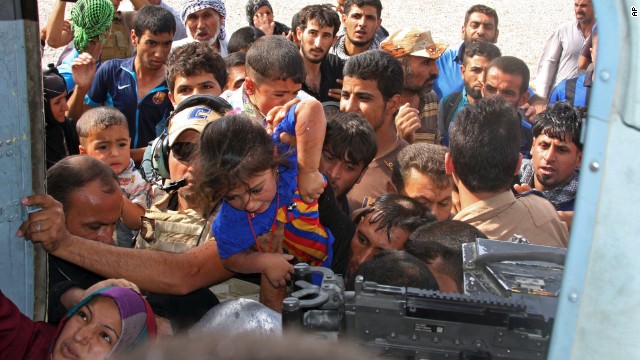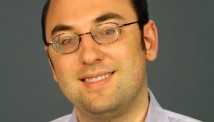Sep 01, 2014
An American’s gateway to jihad, CNN.com
An American's gateway to jihad
By Peter Bergen and David Sterman
updated 9:06 PM EDT, Fri August 29, 2014
 Iraqi Shiite Turkmens, mostly women and children, try to board an Iraqi Army helicopter aid flight bringing in supplies to the town of Amerli, Iraq, on Saturday, August 30. Amerli had been surrounded by fighters from the terror group ISIS since mid-June, but on Sunday the siege was broken by Iraqi security and volunteer forces, according to retired Gen. Khaled al-Amerli, an Amerli resident and member of its self-defense force.
Iraqi Shiite Turkmens, mostly women and children, try to board an Iraqi Army helicopter aid flight bringing in supplies to the town of Amerli, Iraq, on Saturday, August 30. Amerli had been surrounded by fighters from the terror group ISIS since mid-June, but on Sunday the siege was broken by Iraqi security and volunteer forces, according to retired Gen. Khaled al-Amerli, an Amerli resident and member of its self-defense force.
STORY HIGHLIGHTS
- Peter Bergen: New video of American suicide bomber shows Turkey networks key in jihad
- He says Moner Abu-Salha describes how Turkey was gateway in al Qaeda connection
- He says "homegrown" terrorists a key concern in U.S., but so far none have attacked on U.S. soil
- Bergen: Turkey must step up efforts to stem flow of fighters through country to Syria, Iraq

Peter Bergen

David Sterman
Abu-Salha says he travelled from the States to Turkey where he eventually connected with representatives of the Nusra Front, al Qaeda's Syrian affiliate, explaining, "From tons of research I knew that mujahideen [holy warriors] come from all around the world, they come to Istanbul. I heard that the Turkey-Syrian border is close." Abu-Salha says that he was inspired to go to fight in the Syrian "holy war" by a lecture by the notorious Yemeni-American militant cleric, Anwar al-Awlaki who said this about traveling to jihad: "It's like a cliff, you jump off the cliff but you don't know if the water is deep or shallow. ... You just have to jump and put you're (faith) in Allah that the water is going to be deep and you won't be harmed." As Abu-Salha tells it, he arrived in Turkey with barely enough money for a Turkish visa and no contacts, but he eventually encountered a member of al Qaeda in Turkey who was bearded, dressed all in black and was missing an arm. The al-Qaeda fighter didn't speak English but Abu-Salha said, "I'm mujahidin, I'm mujahidin," which the man understood and he took him on a bus to meet another al Qaeda member who did speak some English. Abu-Salha recalls, "They get me something to eat. I tell them I come to fight jihad. I want to feel, die shaheed (as a martyr)." He says that the members of al Qaeda then took Abu-Salha to a "safe house" in Turkey where he encountered two other al Qaeda fighters who had been wounded and who were recovering in the house. Abu-Salha stayed at the safe house for a month, he says, before he was spirited across the border into Syria. The issue of "homegrown" American extremists fighting in Iraq and Syria has raised significant concerns among counterterrorism officials. The government is tracking about 100 Americans who have fought or attempted to fight in the Syrian conflict. Douglas McArthur McCain, who grew up in Minnesota, died while fighting for the ultra-militant Islamic State in Syria this past weekend. In addition to Abu-Salha and McCain, eight Americans have been charged with crimes related to supporting or attempting to support militant jihadist groups in Syria and Iraq. However, for now, no American involved in the Syrian and Iraqi conflicts has been charged with plotting an attack inside the United States. Both Moner Abu-Salha and Douglas McCain died fighting in the region rather than conducting attacks in their own country. Gen. Martin Dempsey, the chairman of the Joint Chiefs of Staff, told reporters on August 25 that there are, so far, no signs of "active plotting against the homeland" by the Islamic State. As fears heighten of the potential threat from returning Western foreign fighters who have traveled to Syria or Iraq, restraining the flow of these fighters through Turkey must be a key objective. A European diplomat in Turkey told Reuters, "In recent months especially we've seen a real hardening in Turkey's attitude, a recognition that this is a potential threat to their national security and a desire to take more practical steps through intelligence channels, police channels." There are signs that Turkey's new efforts may be having an effect. One Islamic State spokesman told the Washington Post, "It is not as easy to come into Turkey anymore." Abu-Salah's recounting of his travel illustrates the potential risks foreign fighters take when seeking to reach Syria -- which may be exploitable by security services. Of his initial attempts to connect with militants in Turkey he said: "It was very dangerous what I was doing because I could have went to jail." If Turkey's new measures to disrupt the foreign fighter flow continue and a coalition can be built to adequately track and disrupt movement of militants into Syria and Iraq, the threat posed by Americans and other Westerners fighting with jihadist groups in the region may diminish over time.
FEATURED BOOK

